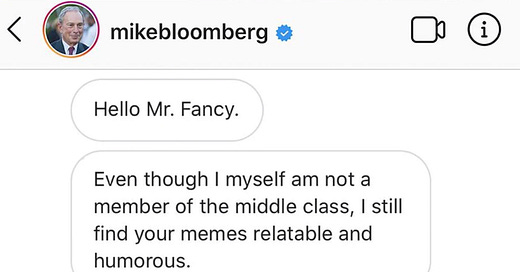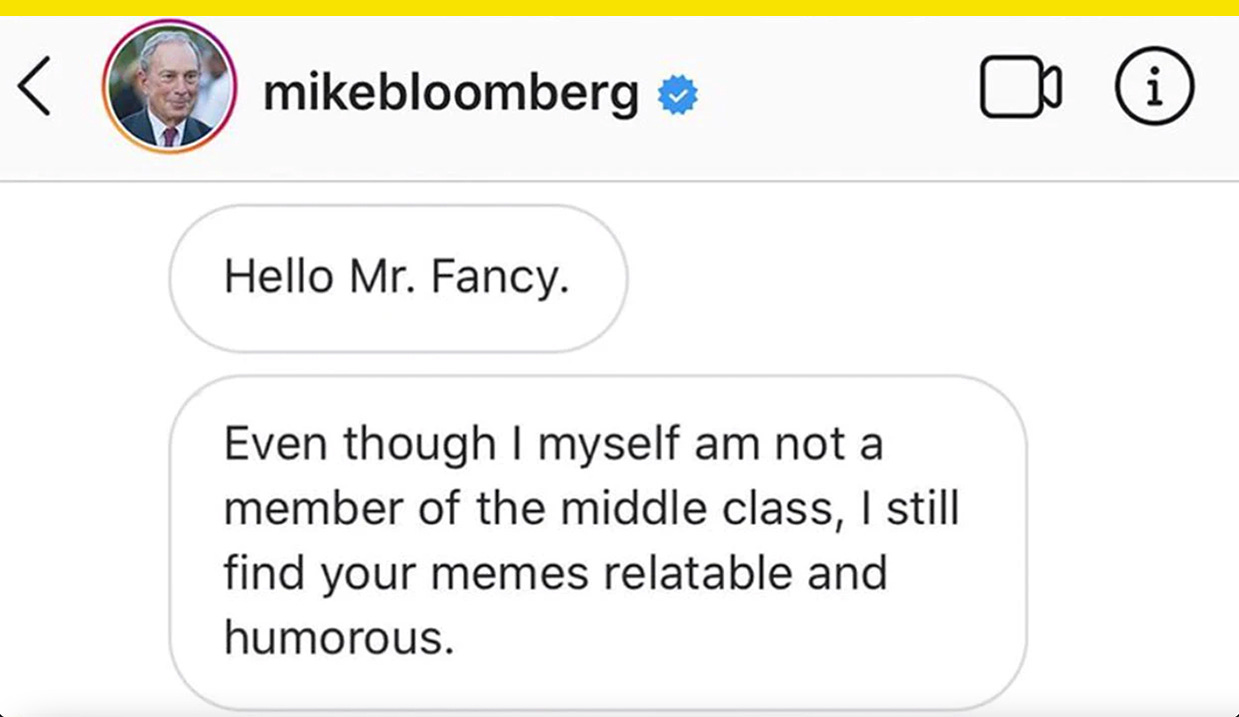What the Bloomberg campaign's Instagram #sponcon tells us about the future of political ads
I can only imagine what our ancestors would think if they saw what a political ad could look like in the year 2020.
Last week, former New York City Mayor Michael Bloomberg’s presidential campaign ran sponsored posts on Instagram meme accounts. This “#sponcon” (sponsored content) ran on at least 20 pages and featured imagined DM conversations between the accounts and Bloomberg, with the disclosure “(and yes this is really #sponsored by @mikebloomberg).”
Here’s the post that ran on @kalesalad.
And here’s one that ran on @middleclassfancy.
The ads are self-aware, acknowledging the “How do you do, fellow kids” nature of a 78-year-old man interacting with meme culture. And although they’re unusual, they could very well be the future of campaign advertising.
Before the ads were published, The Daily Beast reported the Bloomberg campaign set up an offer on Tribe, a branded content platform, to offer micro-influencers (users with up to 100,000 followers) $150 for posts about “why Mike Bloomberg is the electable candidate who can rise above the fray, work across the aisle so ALL Americans feel heard & respected.” A Yello review of Tribe found there are currently no Bloomberg partnership offers on the platform.
The meme accounts that published Bloomberg ads were much bigger than micro-influencers, with millions of followers each. According to the New York Times, the meme account campaign was coordinated with a new company called Meme 2020 that was created by some of the top meme account creators on Instagram. The Bloomberg campaign did not respond to a question about how much it paid for the posts.
“Mike Bloomberg 2020 has teamed up with social creators to collaborate with the campaign, including the meme world,” Bloomberg senior national spokesperson Sabrina Singh said in a statement provided to Yello. “While a meme strategy may be new to presidential politics, we're betting it will be an effective component to reach people where they are and compete with President Trump's powerful digital operation.”
Influencer marketing on the rise
Influencer marketing was estimated to be worth as much as $8 billion in 2019, according to Business Insider Intelligence. And in a time of declining trust among institutions, influencers have the confidence of their followers.
A June 2019 study of 1,500 consumers aged 18 to 34 in the U.S., UK, and China by Edelman, a public relations firm, found that 63% say they trust what an influencer says about a brand more than a brand’s advertisement. The study also found 58% said they had bought a new product in the last six months because of an influencer.
Credit: Edelman
While the Bloomberg campaign may have run the earliest sponsored posts that we know about, there have been earlier signs that political influencer marketing was on the rise.
Before she dropped out, Sen. Kamala Harris’ (D-Calif.) campaign hired Deja Foxx, a young woman who went viral after confronting then-Sen. Jeff Flake (R-Ariz.) about legislation that defunded Planned Parenthood, as its “influencer and surrogate strategist,” per her bio. Foxx has more than 21,000 followers on Twitter, and more than 18,000 followers on Instagram.
And last year, President Trump invited pro-Trump content creators to the White House for a social media summit. Make no mistake about it, Diamond and Silk are political influencers.
Read more: [How Trump is redefining influencer politics]
One big problem we face with influencer advertising in politics is that our political ad policies haven’t caught up to the social age. Facebook said Friday it would not include sponsored posts in its ad library, which tracks campaign ads and spending, and the Federal Election Commission doesn’t have rules about influencers.
“The Federal Election Commission last wrote internet communication disclaimer regulations several eons ago, in 2006, when political internet advertising was in its infancy,” FEC Commissioner Ellen Weintraub said in a statement in 2019, according to BuzzFeed News. “The Commission has since been unable to revamp its regulations to better tailor the disclaimer rules to today’s far more significant and varied political internet advertising market.”
Political ads from candidates for federal office on TV and radio must include disclosures — the “I’m [candidate X] and I approve this message” part of an ad. Known as the “Stand By Your Ad” provision, it required campaigns to take responsibility for how and what they advertised. There’s no equivalent for sponsored ads on social media.








